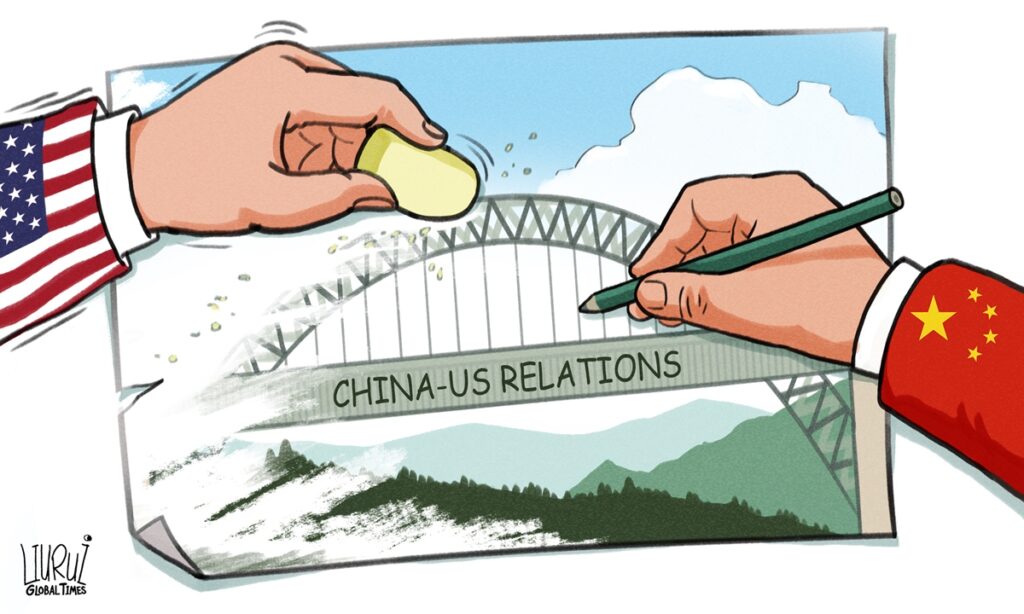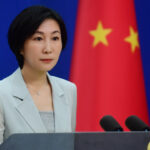Before departing China on Sunday, US Treasury Secretary Janet Yellen said 10 hours of meetings with senior Chinese officials in the last few days were “direct” and “productive,” Reuters reported on Sunday.
It is hoped that Yellen can bring back to Washington what Chinese officials had told her and what she had seen and felt in China during her four-day trip to Beijing. It will help US policymakers form a more objective and rational view of China, which is exactly what US political circles currently need badly.
Republican US presidential candidate and Florida governor Ron DeSantis was quoted by Reuters as saying on Sunday that he would take steps to revoke China’s permanent normal trade relations status if he won the 2024 White House race. However, anyone with basic common sense about China-US economic relations knows that trade is mutually beneficial to both the US and China, so efforts to scupper bilateral trade will eventually backfire and hurt US economy. Regrettably, the surge of anti-China sentiment remains strong among the US elites. By unjustifiably blaming or suppressing China, some US politicians are seeking to gain more support from the public, but all their attempts are bringing uncertainties to the US economy.
Compared with some US political elites indulging in a geopolitical mind-set, Yellen has a relatively pragmatic attitude toward China. Her visit will probably widen the political divide within the US, with some politicians continuously attacking China. Although Yellen’s visit ended on Sunday, the story should not come to an end. Bringing back the insights gained in China should be the second half of Yellen’s push to make the world’s two largest economies “find a way to live together and share in global prosperity.” If the US truly listens to China’s words, there will be fewer setbacks ahead.
When Chinese Premier Li Qiang met with Yellen in Beijing on Friday, Li said China’s development is an opportunity rather than a challenge for the US, and a gain rather than a risk.
We believe Yellen’s economics background will, to some extent, help her adopt a relatively rational and pragmatic attitude toward China. Although Washington has been trying to block China’s rise, issuing sweeping restrictions on the types of advanced semiconductors and chipmaking machinery that could be sent to China, China’s economy has proved to be resilient.
It’s just an illusion that US’ moves toward a trade war, a chip war, or economic “decoupling,” “de-risking” push could possibly daunt China. Any such moves based on the erroneous belief that protectionism could benefit the US and hurt China’s industries would only end up backfiring on the world’s largest economy.
Despite of an escalating US crackdown, China has maintained its position as the world’s largest manufacturing hub, with mechanical and electrical products export hitting $810.6 billion in the first five months of this year. China’s economic growth has made important contribution to the development and prosperity of the world economy, especially to the stability and recovery of world economy after the pandemic disruption. Yellen’s trip to China is a chance to help her realize China’s economic resilience against pressure.
After China has announced it would impose export controls on gallium and germanium, two rare elements widely used in the semiconductor industry, Chinese officials once again called on the US to take “practical action” in response to China’ concerns about US sanctions on Chinese firms during their talks with Yellen. When the US imposes various export restrictions on China, it should not expect China to remain silent and not fight back. Of course, China will not be as rule-breaking as the US is. However, if Yellen can clearly convey China’s attitude to US political circles, it will probably help curb the surge of anti-China sentiment in the US.
Washington should be responsible for the downturn in China-US relations. Currently, the China-US relationship is at a crossroads and the ball is in the US court to improve or further undermine bilateral ties. Communication between China and the US can help eliminate misunderstandings and provided impetus for stabilizing bilateral ties. More importantly, the US needs to stop viewing this relationship through a zero-sum mind-set.
Hopefully Yellen’s visit to China can help the US craft a more rational China policy.
(Global Times)




